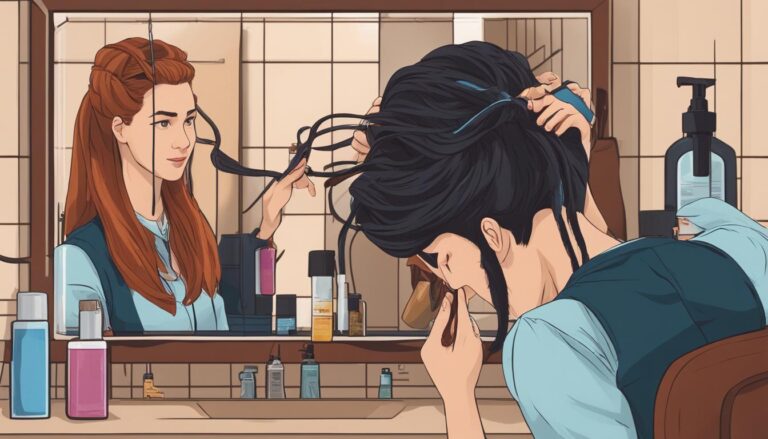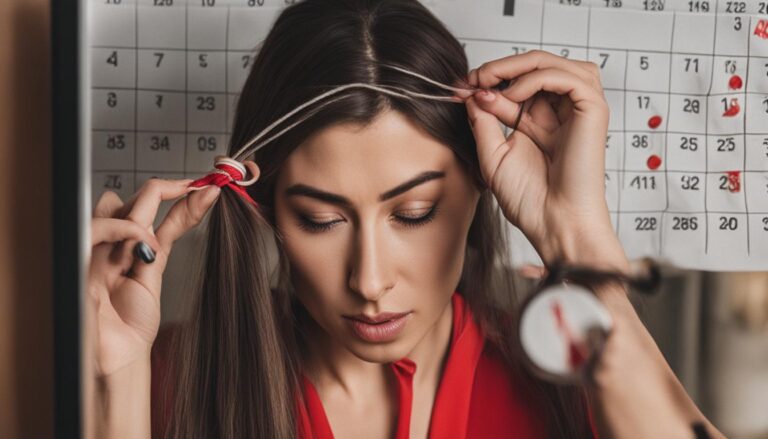Can too much vitamin C cause hair loss?
Excessive intake of vitamin C can potentially lead to hair loss. While vitamin C is beneficial for the body, too much of it can result in hypervitaminosis, which can negatively impact hair follicles and accelerate the shedding of hair. It is important to maintain a balanced intake of vitamin C to promote hair health and growth.
Key Takeaways:
- Excessive intake of vitamin C may contribute to hair loss.
- Maintaining a balanced intake of vitamin C is crucial for promoting hair health.
- Hypervitaminosis can negatively impact hair follicles and accelerate hair shedding.
- Consult with a healthcare professional for personalized advice on vitamin C intake and potential hair loss concerns.
- Adequate vitamin C intake is important for overall hair health.
The Link Between Vitamin A and Hair Loss
Vitamin A is an essential nutrient that plays a crucial role in promoting hair growth. It helps stimulate hair follicles and supports the production of sebum, which keeps the scalp moisturized. Adequate levels of vitamin A are necessary for maintaining healthy hair.
However, it is important to note that excessive intake of vitamin A can lead to a condition called hypervitaminosis A. This occurs when there is an overdose of vitamin A in the body, either through excessive supplementation or consumption of foods high in vitamin A.
Hypervitaminosis A can have adverse effects on hair health, including increased hair loss. When the body has too much vitamin A, it can overstimulate the hair follicles, leading to a higher rate of hair shedding. It is important to maintain a balanced and moderate intake of vitamin A to ensure optimal hair health.
“Excessive intake of vitamin A can lead to hypervitaminosis A, which can overstimulate hair follicles and result in increased hair loss.”
The Dangers of Vitamin A Overdose
While vitamin A is crucial for hair health, it is essential to be cautious about exceeding the recommended daily intake. Consuming excessive amounts of vitamin A supplements or consuming foods high in vitamin A can lead to vitamin A toxicity. Symptoms of vitamin A overdose may include hair loss, dry skin, joint pain, and nausea.
If you suspect vitamin A overdose or have concerns about hair loss, it is advisable to consult a healthcare professional. They can assess your vitamin A levels and provide personalized recommendations to support your hair health.
In summary, while vitamin A is essential for hair growth, excessive intake can lead to hypervitaminosis A and potentially contribute to hair loss. It is important to maintain a balanced intake of vitamin A through a well-rounded diet and appropriate supplementation if necessary. Consulting a healthcare professional can provide valuable guidance on maintaining optimal vitamin A levels and promoting healthy hair.
The Role of B Vitamins in Hair Health
B vitamins play a crucial role in maintaining healthy hair and preventing hair loss. Deficiencies in these essential nutrients can lead to weakened hair follicles and increased hair shedding. Let’s take a closer look at the specific B vitamins that promote hair health:
Vitamin B Deficiency and Hair Loss
One of the main causes of hair loss is a deficiency in B vitamins. Specifically, vitamin B7, also known as biotin, and vitamin B5, also known as pantothenic acid, are vital for healthy hair growth. Biotin helps strengthen the hair shaft, reducing hair breakage and promoting thicker, fuller hair. Pantothenic acid supports the production of keratin, a protein that makes up the structure of the hair.
“A deficiency in biotin or pantothenic acid can lead to weak and brittle hair, as well as increased hair loss.”
The Benefits of Biotin for Hair
Biotin is often referred to as the “beauty vitamin” due to its positive effects on hair health. It not only strengthens the hair shaft but also improves the elasticity of the hair, reducing the likelihood of breakage and split ends. Biotin deficiency can result in thinning hair and even hair loss, so it’s important to ensure an adequate intake of this B vitamin through diet or supplementation.
Pantothenic Acid for Hair Growth
Pantothenic acid is involved in the production of coenzyme A, which plays a crucial role in various metabolic processes that support hair growth. This B vitamin helps nourish the hair follicles, promoting healthy hair growth and reducing hair loss. Including pantothenic acid-rich foods like eggs, whole grains, and legumes in your diet can help maintain optimal levels of this hair-friendly vitamin.
Ensuring an adequate intake of B vitamins, particularly biotin and pantothenic acid, is essential for maintaining healthy hair and preventing hair loss. If you suspect a deficiency in these nutrients or experience excessive hair shedding, it’s best to consult with a healthcare professional to determine the underlying cause and appropriate treatment.

The Impact of Vitamin E on Hair Loss
Vitamin E is an important nutrient that has been linked to hair health. Its antioxidant properties help protect the scalp and hair follicles from oxidative stress, promoting overall hair growth and preventing damage. However, it is crucial to maintain a balanced intake of vitamin E as excessive amounts can potentially lead to hair loss.
While vitamin E is beneficial for hair health, excessive intake can result in potential side effects, including hair loss. Hypervitaminosis E, or vitamin E overdose, can disrupt the delicate balance of nutrients in the body and negatively affect hair follicles. It is important to consult with a healthcare professional to determine the appropriate dosage of vitamin E for your individual needs.
To maintain healthy hair and prevent vitamin E overdose, it is recommended to obtain vitamin E from natural food sources such as nuts, seeds, spinach, and avocados. These sources provide the recommended daily intake of vitamin E without the risk of excessive consumption. Additionally, incorporating a balanced diet rich in other essential nutrients such as vitamins A, C, and B can further support hair health and growth.
Vitamin E plays a significant role in promoting hair health, but like all vitamins, it is important to maintain a balanced intake to avoid potential side effects. Consult with a healthcare professional to ensure you are getting the right amount of vitamin E for your hair’s needs and to address any concerns about excessive intake and hair loss.
Summary:
- Vitamin E is essential for promoting hair health, thanks to its antioxidant properties.
- Excessive intake of vitamin E can potentially lead to hair loss.
- Consulting with a healthcare professional is crucial to determine the appropriate dosage of vitamin E.
- Natural food sources provide a safe and balanced intake of vitamin E.
- Maintaining a balanced diet rich in essential nutrients further supports hair health and growth.
Vitamin C and Hair Loss: The Potential Connection
When it comes to maintaining healthy hair, many people wonder about the role of vitamin C. While vitamin C is an essential nutrient for overall health, there is limited evidence to suggest a direct link between excessive vitamin C intake and hair loss. However, it is important to understand the impact of vitamin C on hair health and the potential risks of excessive intake.
Vitamin C is known for its antioxidant properties, which help protect the body against the damaging effects of free radicals. It also plays a crucial role in collagen production, which is essential for maintaining the strength and structure of hair follicles. However, it is important to note that hair loss can be caused by various factors, including genetics, hormonal imbalances, and certain medical conditions.
While there is no specific recommended dietary allowance (RDA) for vitamin C, it is generally recommended to consume an adequate amount to support overall health and well-being. Consulting with a healthcare professional can provide personalized advice on vitamin C intake and address any concerns related to hair loss.

Promoting Hair Health: Tips and Recommendations
- Eat a balanced diet rich in fruits, vegetables, and other nutrient-dense foods to ensure a sufficient intake of vitamin C and other essential nutrients.
- Avoid excessive intake of vitamin C supplements unless recommended by a healthcare professional.
- Practice good hair care habits, such as avoiding excessive heat styling, protecting hair from harsh environmental conditions, and using gentle hair products.
- Manage stress levels, as excessive stress can contribute to hair loss.
Overall, maintaining a balanced intake of vitamins, including vitamin C, is crucial for promoting overall hair health. While the direct connection between excessive vitamin C intake and hair loss is not yet fully understood, it is important to prioritize a well-rounded approach to hair care that includes a healthy diet, proper hair care habits, and addressing any underlying medical conditions that may contribute to hair loss.
Conclusion
In conclusion, maintaining a balanced intake of vitamins is crucial for promoting overall hair health. While excessive intake of certain vitamins, such as vitamin A and vitamin E, can potentially lead to hair loss, it is important to understand that individual nutrient needs may vary. Consulting with a healthcare professional can help determine the appropriate intake of vitamins and address any concerns related to hair loss.
Vitamin C is an essential nutrient for overall health, but there is limited evidence to suggest a direct link between excessive vitamin C intake and hair loss. However, it is still important to maintain a balanced intake of vitamin C to promote overall hair health.
B vitamins, including biotin and pantothenic acid, are crucial for maintaining healthy hair. Deficiencies in these vitamins can lead to weakened hair follicles and increased hair loss. It is recommended to ensure an adequate intake of B vitamins through diet or supplementation to support hair health.
Vitamin E, known for its antioxidant properties, is beneficial for promoting healthy hair. However, excessive intake of vitamin E can potentially lead to hair loss. It is crucial to maintain a balanced level of vitamin E to support optimal hair growth.
FAQ
Can too much vitamin C cause hair loss?
Excessive intake of vitamin C can potentially lead to hair loss. While vitamin C is beneficial for the body, too much of it can result in hypervitaminosis, which can negatively impact hair follicles and accelerate the shedding of hair. It is important to maintain a balanced intake of vitamin C to promote hair health and growth.
What is the link between vitamin A and hair loss?
Vitamin A plays a role in stimulating hair follicles and promoting hair growth. However, excessive intake of vitamin A can lead to hypervitaminosis A, which can overstimulate hair follicles and result in increased hair loss. It is important to maintain a sufficient but not excessive level of vitamin A to support healthy hair growth.
How do B vitamins affect hair health?
B vitamins, such as biotin and pantothenic acid, are essential for maintaining healthy hair. Deficiencies in these vitamins can lead to weakened hair follicles and increased hair loss. It is important to ensure an adequate intake of B vitamins through diet or supplementation to support hair health.
Does vitamin E impact hair loss?
Vitamin E is known for its antioxidant properties and its ability to promote healthy hair. However, excessive intake of vitamin E can lead to potential side effects, including hair loss. It is crucial to maintain a balanced level of vitamin E to support optimal hair growth.
Is there a connection between vitamin C and hair loss?
While vitamin C is an essential nutrient for overall health, there is limited evidence to suggest a direct link between excessive vitamin C intake and hair loss. However, maintaining a balanced intake of vitamin C is important for promoting overall hair health. It is recommended to consult with a healthcare professional for personalized advice on vitamin C intake and potential hair loss concerns.







